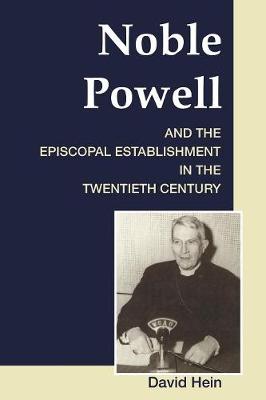Studies in Anglican History
1 total work
Noble Powell and the Episcopal Establishment in the Twentieth Century
by David Hein
Published 18 April 2001
The quintessential man for his own season, Noble Powell (1891-1968) was an episcopal priest and then bishop who epitomized the cultural and ecclesiastical epoch before the tumultuous sixties. This volume, the first biography devoted to a dynamic churchman often referred to as "the last bishop of the old church", fills a major gap in American religious historiography while illuminating the strengths, flaws, and eventual decline of the Protestant establishment in the United States. Deeply influenced by the beliefs and practices of a mix of southern denominations, as well as by the principles and codes of the southern planter class, Powell was raised a Baptist and confirmed (to his family's chagrin) in the Episcopal Church. As parson at the University of Virginia, Powell led a flourishing student ministry before serving as rector of Emmanuel Church in Baltimore and as dean of the National Cathedral. As bishop of the Diocese of Maryland, as in all of his earlier work, Powell distinguished himself by sustaining his human, pastoral focus.
" [Although] the Church is a big business," he said, " let us be sure that we never come to think that [a bishop] is primarily an executive or business administrator. His duty is to shepherd his flock". Hein sketches the spiritual depth, self-discipline, sense of humor, and personal magnetism that anchored Powell's unwavering commitment to the human side of the church. He shows how Powell's outlook as bishop dovetailed with the prevailing temper of his time and also discusses how Powell's leadership style, marked by patience and an aristocratic civility, diminished in effectiveness amid the upheaval of the 1960s. "A tall man with a soft answer", Powell emerges as a person of integrity and humanity, one who throughout his long career drew others in and affirmed their best selves.
" [Although] the Church is a big business," he said, " let us be sure that we never come to think that [a bishop] is primarily an executive or business administrator. His duty is to shepherd his flock". Hein sketches the spiritual depth, self-discipline, sense of humor, and personal magnetism that anchored Powell's unwavering commitment to the human side of the church. He shows how Powell's outlook as bishop dovetailed with the prevailing temper of his time and also discusses how Powell's leadership style, marked by patience and an aristocratic civility, diminished in effectiveness amid the upheaval of the 1960s. "A tall man with a soft answer", Powell emerges as a person of integrity and humanity, one who throughout his long career drew others in and affirmed their best selves.
